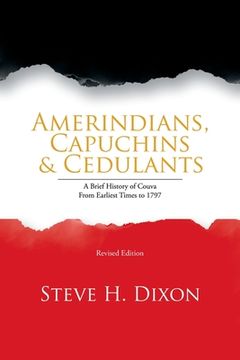Compartir
Amerindians, Capuchins & Cedulants: A Brief History of Couva from Earliest Times to 1797 (en Inglés)
Steve H. Dixon
(Autor)
·
Authorhouse
· Tapa Blanda
Amerindians, Capuchins & Cedulants: A Brief History of Couva from Earliest Times to 1797 (en Inglés) - Dixon, Steve H.
$ 24.700
$ 41.160
Ahorras: $ 16.460
Elige la lista en la que quieres agregar tu producto o crea una nueva lista
✓ Producto agregado correctamente a la lista de deseos.
Ir a Mis Listas
Origen: Estados Unidos
(Costos de importación incluídos en el precio)
Se enviará desde nuestra bodega entre el
Jueves 30 de Mayo y el
Martes 11 de Junio.
Lo recibirás en cualquier lugar de Chile entre 1 y 3 días hábiles luego del envío.
Reseña del libro "Amerindians, Capuchins & Cedulants: A Brief History of Couva from Earliest Times to 1797 (en Inglés)"
Couva is a modern pulsating town in Trinidad-an island once owned by Spain-that is prosperous and sufficiently well populated. But the town wasn't always as lively and contemporary as it is today. Old Couva (i.e., Savaneta) had been settled by Amerindians who originated in South America. From being a stretch of mostly uncultivated fertile soil to being the centre of the Saint Anne's Mission and founded by Roman Catholic Capuchin missionaries in Eastern Couva in 1687 to convert the pagan Amerindians to Christianity as part of Spain's colonial policy, it emerged, after the closure of the mission, as primarily sugar plantations functioning profitably off the brutal exploitation of black slaves as labourers. Starting in the late eighteenth century, Couva was one area where the Spanish government granted land to immigrant planters to grow crops. Due to its fertile soils, the planters mostly cultivated sugarcane. Couva sprang up as a new community called Exchange Village-quite different from the Catholic mission-around St. Paul's Roman Catholic Church post-emancipation until today, when it has become Trinidad's industrial capital based on a vibrant petrochemical industry. Couva has evolved both culturally and dynamically over the years, contributing to its rich culture, history, and heritage. This brief historical account of old Couva covers pre-Columbian times through the period of Spanish rule from 1498 to 1797, the year when the British seized control of Trinidad. It examines how the above-mentioned seminal developments have had a profound impact on the socioeconomic history of Couva. It also briefly covers the renaissance of Couva as a village and its evolution into a modern town.
- 0% (0)
- 0% (0)
- 0% (0)
- 0% (0)
- 0% (0)
Todos los libros de nuestro catálogo son Originales.
El libro está escrito en Inglés.
La encuadernación de esta edición es Tapa Blanda.
✓ Producto agregado correctamente al carro, Ir a Pagar.

